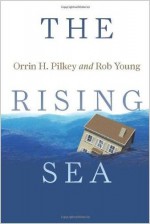
A book co-authored by Western Carolina University professor Rob Young about the global threat to coastal communities posed by rising sea levels has proven so popular that its publisher is announcing a release in paperback.
“We’re very pleased with how the book was received and think a paperback edition will allow us to reach an even broader audience,” said Emily Davis, developmental editor at Island Press, publisher of “The Rising Sea.”
Written by Young and Orrin Pilkey, his friend and mentor from Duke University, “The Rising Sea” was published in hardback format in 2009. The book has won critical acclaim from the popular and scientific press.
The Florida Times-Union praised “The Rising Sea” as “…a must-read, not only for those of us living on the coast but for everyone concerned about meeting the challenges of the future.” Publishers Weekly said, “Pilkey and Young’s balanced, optimistic perspective on the tough decisions that lie ahead should garner interest from policy makers and real estate developers as well as environmentalists.”
The journal Issues in Science and Technology commended Young and Pilkey for being insistent, but not unduly alarmist: “‘The Rising Sea’ takes on a host of contentious issues, ranging from the science of climatology to the politics of coastal planning to the economics of engineering, all the while taking into account the perverse psychology of a populace loath to acknowledge the truth when doing so proves disruptive.”
In their book, Young and Pilkey warn that rising ocean levels brought about by global warming is not something that might happen in the future, but is happening now. They go on to argue that societies around the world must begin responding to the challenges of sea-level rise “in a planned and rational way, taking the long-term view” before major cities and other coastal development are inundated.
Young said he believes it is “important for scientists to speak more forcefully” about issues such as sea-level rise to combat the wave of naysayers who use the media to spread non-scientific falsehoods. “We hope this book will start a national conversation,” he said.
Young is professor of geosciences and director of the Program for the Study of Developed Shorelines at WCU, while Pilkey, a pioneer in the study of American shoreline development policy, holds the position of professor emeritus in the Nicholas School of the Environment at Duke. The two scientists became acquainted when Young was in graduate studies at Duke, and Pilkey was Young’s adviser and teacher.
Young earned his doctorate in geology at Duke in 1995 and joined WCU’s faculty in 1997. Over the years, he has become a much-sought-after expert on the topics of hurricane impacts and coastal management.
Pilkey founded a coastal science and policy center, the Program for the Study of Developed Shorelines, at Duke in 1985, and when he decided to focus on writing books and articles in 2006, he chose his former student to take over the program. PSDS moved to WCU’s campus in fall of that year.






